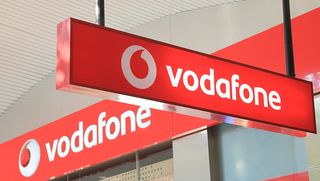MWC 2019: Vodafone is bringing affordable IoT to SMEs
The giant telco claims that SIM cards are becoming a thing of the past and SMEs are becoming increasingly more reliant on IoT

Vodafone and Arm have partnered to simplify the deployment of Internet of Things (IoT) devices, cutting the cost of connectivity by up to 50%.
At MWC 2019 it was revealed that Vodafone is now contracted to be the bootstrap provider for Arm and will provide the same connectivity that a SIM card provides, but built straight onto the processor's silicon using integrated SIM (iSIM) technology.
Cutting out the need for a physical connectivity card cuts costs dramatically, primarily in the supply chain and these savings will be largely seen in the IoT industry, said Phil Skipper, head of business development at Vodafone.
"It's actually quite a complicated process, there is a complex logistics chain and in that, there are multiple players," said Skipper. "You've got hardware costs and you've also got handling costs" so by designing it into the silicone it takes out previously required stages of development and then makes the manufacturing of autonomous cars much cheaper."
Vodafone's focus on IoT is driven by data and reports which indicate that 8% of its enterprise customers are now reliant on IoT for their businesses.
That's a crucial thing because IoT adoption requires scrapping legacy technology in favour of new IoT processes. Skipper said that the fact that people are relying on IoT, "it shows that it's reached a level of capability and security" which is attracting businesses to accelerate their digital transformation.
He also thinks that IoT is now moving down into the small and medium-sized business range where SMEs are not just seeing IoT as an abstract technology, now it's more of a technology that can really help their business.
Get the ITPro. daily newsletter
Receive our latest news, industry updates, featured resources and more. Sign up today to receive our FREE report on AI cyber crime & security - newly updated for 2024.
Previously only adopted on a large-scale basis by large and global enterprises, SMEs are starting to see the value of the technology. Reliance is increasing and it's becoming more and more accessible for smaller businesses.
He adds that IoT adoption is seeing a faster return on investment (ROI) because of the shift away from legacy tech in favour of new digital processes.
In terms of Vodafone's progress with a consumer 5G rollout, it was less inclined to make any comment in the wake of EE's confident claim yesterday that it would be the first network in the UK to deliver 5G to the UK.
What Vodafone says it is doing well is setting up private networks for areas where there is a lack of connectivity such as oil rigs and mines - places that really need connectivity.
Just like with the private network launched at Manchester Airport recently, 5G networks are coming to places that need a fast connection such as in factories where workers are using deck phones and two wave radios. Places like this can move from mixed technologies to a more unified 5G network.

Connor Jones has been at the forefront of global cyber security news coverage for the past few years, breaking developments on major stories such as LockBit’s ransomware attack on Royal Mail International, and many others. He has also made sporadic appearances on the ITPro Podcast discussing topics from home desk setups all the way to hacking systems using prosthetic limbs. He has a master’s degree in Magazine Journalism from the University of Sheffield, and has previously written for the likes of Red Bull Esports and UNILAD tech during his career that started in 2015.




